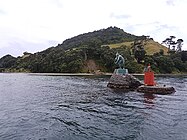Frank Szirmay
Frank Szirmay (1916–1985) was a Hungarian New Zealand sculptor. In 1956 Szirmay fled the Hungarian revolt with his family, and they emigrated to New Zealand.[1] Szirmay's step-daughter is well-known sculptor Marté Szirmay.

Biography
[edit]Szirmay began his career as a painter, but in the 1970s gained a national reputation as a sculptor of bronze figures in the Academic Realist tradition.[2] Szirmay taught art, and one of his most well-known pupils was Les Gibbard.[1] Szirmay's figurative sculptural style can be seen in a number of notable public commissions around New Zealand.
Notable works
[edit]Young Nick
[edit]
Young Nick - bronze figure of Nicholas Young, unveiled in 1969 by Governor-General Sir Arthur Porritt at Churchill Park on Waikanae Beach, Gisborne as part of the Cook Bicentenary Celebrations, which commemorated the first sighting of New Zealand on James Cook's voyage in 1769.[1][3] The statue was gifted by the New Zealand Insurance Company. In 1988 the statue was moved to the mouth of the Tūranganui River, and is now positioned so that Young Nick points to Young Nick's Head across the bay.[4]
Tangaroa
[edit]Tangaroa - bronze figure of Tangaroa, Māori God of the sea, installed in 1969. The status is situated at the entrance to Tauranga Harbour.[1] Tangaroa is portrayed as a crouching warrior grasping a taiaha, and in recent years was moved to face harbour visitors.[5]

The Spirit of Napier
[edit]The Spirit of Napier - bronze figure of a slender 'golden girl', with arms upraised on a high column. This work was installed in 1971 and memorialises Napier's rebirth after the devastating earthquake of 1931.[1] The statue was gifted to the city by the late Dr Thomas Gilray, a former superintendent of the Napier Hospital.[6] In 2011 it was taken down by the Napier Council to be repaired after bronze rot was discovered.[7]
The Discovery of New Zealand Chess Set
[edit]Another notable commission was a chess set, titled The Discovery of New Zealand Chess Set, which depicts a peaceful meeting between Māori and Europeans, and was another work commissioned to commemorate the Cook Bicentenary. This work is held in the collection of Museum of New Zealand Te Papa Tongarewa.[8]
References
[edit]- ^ a b c d e Bell, Leonard (17 November 2017). Strangers Arrive: Emigrés and the Arts in New Zealand, 1930–1980. Auckland University Press. ISBN 978-1-77558-954-9.
- ^ Mare, Barbara (1989). "Marte Szirmay: Paying Homage to the Organic". Woman's Art Journal. 10 (2): 19. doi:10.2307/1358207. JSTOR 1358207.
- ^ "Our Cover". Gisborne Photo News. 9 August 1972.
- ^ "Waikanae Beach, Gisborne, New Zealand". The Captain Cook Society (CCS). Retrieved 14 April 2020.
- ^ "Bay Explorer | Maori God of the Sea | Statue of Tangaroa". Bay Explorer. Retrieved 14 April 2020.
- ^ "Spirit of Napier". www.ahuriri-rotary.org.nz. Retrieved 14 April 2020.
- ^ Carpinter, Bernard (7 May 2011). "Years Unkind to Golden Girl". The Dominion Post.
- ^ "Loading... | Collections Online - Museum of New Zealand Te Papa Tongarewa". collections.tepapa.govt.nz. Retrieved 14 April 2020.
